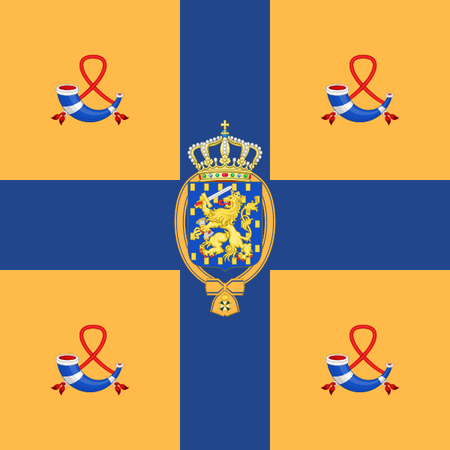“Dutch monarchs will always be with the people”
Why the Netherlands respects its traditions and political system
There is a convincing denial of the well-known but rather groundless allegation that monarchy in today’s Europe is a “hopelessly archaic” institution that does not fit in with democracy – it is the political institutions of the Kingdom of the Netherlands. For example, Queen Juliana (who reigned until 1980, when she abdicated in favor of her daughter, Princess Beatrix) used to display truly, not ostentatiously, democratic ways. For example, she liked to partake of the hallmark Dutch herring, surrounded by a host of people. So this queen had every right to say: “We, monarchs of the Netherlands, have always been and will be with our people.” Here is just one example: in spite of the Nazis’ entreaties, pressure, and blackmail (the Third Reich considered the Orange-Nassau dynasty, which had reigned since 1815, as quite legitimate and even “Aryan”), Queen Wilhelmina strongly condemned the occupation and left the country, together with the government, for Britain. (An interesting fact: the 20th century was predominantly the time of women on the throne – Wilhelmina, Juliana, Beatrix.) It is from there that the Dutch Resistance Movement was coordinated. The grassroots know that their monarchs (usually females) by no means cling to power – they, so to speak, “resigned,” three times: Wilhelmina in 1948, Juliana in 1980, and Beatrix in 2013.
The Dutch monarchy assumed its modern shape on March 16, 1815, the day Prince of Orange Willem VI was crowned as King William I. Incidentally, since the reign of William I, who in fact proclaimed himself as king, the power of monarchs in the United Kingdom of the Netherlands has not been considered as one that comes from the Lord God. In this sense, the Dutch monarchy differs from most of the other in Europe. But it would be a bad mistake to think that the Dutch monarch’s power is “purely representative” or even “illusory” and that his or her role boils down to holding official ceremonies. It is totally wrong. Compared to, say, the British monarchy, the Dutch one is weightier. The powers of the monarch are stipulated in the Constitution of the Netherlands (about a third of the articles in the country’s Fundamental Law deal with powers of the head of state). “The Netherlands cannot exist without a monarch,” and, for this reason, the new monarch succeeds to the throne when the previous king or queen terminates their duties (abdicates or dies). Even before being crowned, the Dutch monarch swears to observe the Constitution and do his or her duties with credit. King Willem-Alexander, the son of Queen Beatrix, has been occupying the throne since 2013. The monarch is sworn in at a joint session of Staten-Generaal (parliament).
Under Article 42 of the Constitution, the monarch is a member of the government, but, unlike the ministers, s/he has no immunity and bears no political responsibility. Therefore, s/he cannot be in opposition to the government or make decisions on his/her own.
Every Monday, the prime minister (Mark Rutte since 2010) informs the monarch of the resolutions the government passed on Friday. This gives the king a nice opportunity to advise the prime minister on the basis of his experience and knowledge of principal matters. This is the way informal influence is exerted on governmental decisions.
The monarch represents the Kingdom of the Netherlands in his country and abroad and makes numerous foreign visits. As president of the State Council (although he does not vote at its meetings), the monarch delivers an annual Address from the Throne during the official opening of a parliamentary session, where he presents the government’s plans for the next year. The king or queen exerts quite a noticeable influence on the formation of the Cabinet according to the results of the latest parliamentary elections because it is the monarch’s prerogative to appoint the people in charge of inter-party negotiations and to select the ministers (they are known as “formers,” and quite often one of them becomes the next premier). The monarch actively works on behalf of all the citizens, knits together all the strata of society, and supports the organizations and people who promote national unity. What is more, the head of state must be politically neutral, which is a constitutional duty, not just a “good intention.”
The royal family has six palaces at its disposal, including the royal palace in Amsterdam. The monarch is exempt from paying the inheritance tax, when it is about the property s/he has inherited. Portraits of the monarch are depicted on Dutch euro coins and postage stamps. The king’s birthday is an official public holiday. Lese majesty is a criminal offense that carries a maximum penalty of five years in prison. The marriage of the heir apparent is subject to parliamentary approval – the prince or princess who has entered into marriage without the permission of parliament are denied the right to succeed to the throne (as a song goes, “no king can marry for love”).
***
Durable and lasting political and historical traditions are the backbone of a nation. When the head of state represents all the citizens (I stress “all”), not only the oligarchic groups and politico-criminal clans, and is aware of his/her responsibility towards the present, past, and future generations, it’s no use arguing whether this state is democratic.
Newspaper output №:
№36, (2017)Section
Topic of the Day





